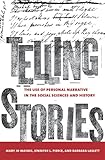Telling Stories : The Use of Personal Narratives in the Social Sciences and History / Barbara Laslett, Mary Jo Maynes, Jennifer L. Pierce.
Material type: TextPublisher: Ithaca, NY : Cornell University Press, [2011]Copyright date: ©2012Description: 1 online resource (200 p.)Content type:
TextPublisher: Ithaca, NY : Cornell University Press, [2011]Copyright date: ©2012Description: 1 online resource (200 p.)Content type: - 9780801473920
- 9780801459030
- 300.72 22
- H61.29 .M39 2008eb
- online - DeGruyter
- Issued also in print.
| Item type | Current library | Call number | URL | Status | Notes | Barcode | |
|---|---|---|---|---|---|---|---|
 eBook
eBook
|
Biblioteca "Angelicum" Pont. Univ. S.Tommaso d'Aquino Nuvola online | online - DeGruyter (Browse shelf(Opens below)) | Online access | Not for loan (Accesso limitato) | Accesso per gli utenti autorizzati / Access for authorized users | (dgr)9780801459030 |
Frontmatter -- Contents -- Preface -- Introduction: The Use of Personal Narratives in the Social Sciences and History -- 1. Agency, Subjectivity, and Narratives of the Self -- 2. Intersecting Stories: Personal Narratives in Historical Context -- 3. The Forms of Telling and Retelling Lives -- 4. Personal Narrative Research as Intersubjective Encounter -- 5. Making Arguments Based on Personal Narrative Sources -- Notes -- Index
restricted access online access with authorization star
http://purl.org/coar/access_right/c_16ec
In Telling Stories, Mary Jo Maynes, Jennifer L. Pierce, and Barbara Laslett argue that personal narratives-autobiographies, oral histories, life history interviews, and memoirs-are an important research tool for understanding the relationship between people and their societies. Gathering examples from throughout the world and from premodern as well as contemporary cultures, they draw from labor history and class analysis, feminist sociology, race relations, and anthropology to demonstrate the value of personal narratives for scholars and students alike.Telling Stories explores why and how personal narratives should be used as evidence, and the methods and pitfalls of their use. The authors stress the importance of recognizing that stories that people tell about their lives are never simply individual. Rather, they are told in historically specific times and settings and call on rules, models, and social experiences that govern how story elements link together in the process of self-narration. Stories show how individuals' motivations, emotions, and imaginations have been shaped by their cumulative life experiences. In turn, Telling Stories demonstrates how the knowledge produced by personal narrative analysis is not simply contained in the stories told; the understanding that takes place between narrator and analyst and between analyst and audience enriches the results immeasurably.
Issued also in print.
Mode of access: Internet via World Wide Web.
In English.
Description based on online resource; title from PDF title page (publisher's Web site, viewed 02. Mrz 2022)


